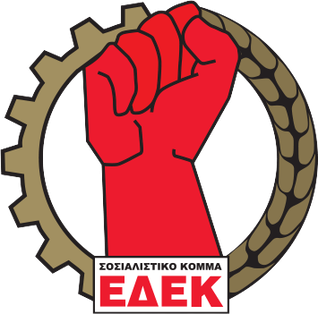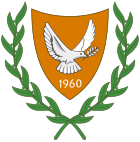
The Progressive Party of Working People is a Marxist–Leninist communist party in Cyprus.

Makarios III was a Greek Cypriot clergyman and politician who served as Archbishop of the autocephalous Church of Cyprus from 1950 to 1977 and as the first President of Cyprus between 1960 and July 1974, with a second term between December 1974 and 1977.

Efstathios "Tassos" Nikolaou Papadopoulos was a Cypriot politician and barrister, who served as President of Cyprus from 2003 to 2008.

The EDEK Socialist Party is a Greek Cypriot nationalist, social-democratic political party in Cyprus.

Glafcos Ioannou Clerides was a Cypriot statesman, who served as President of Cyprus in 1974 and from 1993 to 2003.

Spyros Achilleos Kyprianou was a Cypriot barrister and politician, who served as President of Cyprus from 1977 to 1988. He also served as President of the Cypriot House of Representatives from 1976 to 1977 and then again from 1996 to 2001, as well as being President of the Democratic Party, which he founded, from 1976 to 2000.

At the national level, the Republic of Cyprus holds elections for its head of state, the President of Cyprus, and for its legislature, the House of Representatives.

Cyprus was part of the British Empire, under military occupation from 1914 to 1925, and a Crown colony from 1925 to 1960. Cyprus became an independent nation in 1960.

The London and Zürich Agreements for the constitution of Cyprus started with an agreement on 19 February 1959 in Lancaster House, London, between Turkey, Greece, the United Kingdom and Cypriot community leaders. On that basis, a constitution was drafted and agreed together with two prior Treaties of Alliance and Guarantee in Zürich on 11 February 1959.

Vassos Lyssarides was a Cypriot politician and physician who was a central figure in the politics of Cyprus after the island's independence.

The Constitution of Cyprus is a document, ratified on August 16, 1960, that serves as the Supreme Law of the Republic of Cyprus defining the system of government of the Cypriot Republic and the civil liberties for the Cypriot citizens. Cypriot government. It was drafted after the country won its independence in 1959 and is Cyprus's first and only constitution to date. The Constitution of the Republic of Cyprus has been in force for 64 years and it has been amended 18 (eighteen) times and 28 Articles of the 199 were modified since 1960. The 18th Amendment concerned Article 111.

Presidential elections were held in Cyprus for the first time on 13 December 1959. Only two candidates contested the election; Makarios III, who was backed by EOKA, and Ioannis Clerides, a member of the Democratic Union who was also supported by AKEL. The result was a victory for Makarios III, who received 67% of the vote, although he did not take office until 16 August 1960. Voter turnout was 91.2%.

Presidential elections were held in Cyprus on 25 February 1968. The result was a victory for the incumbent President Makarios III, who received 96% of the vote. Voter turnout was 93%.

Presidential elections were due to be held in Cyprus in February 1978. However, after Vassos Lyssarides of the Movement for Social Democracy announced on 8 January that he would not stand as a candidate, incumbent president Spyros Kyprianou was left as the only remaining candidate. Kyprianou officially became president on 26 January.

Indirect presidential elections were held in Greece in December 2014 and February 2015 for the succession to Karolos Papoulias as President of the Hellenic Republic. The candidate of the ND–PASOK government, Stavros Dimas, failed to secure the required majority of MPs of the Hellenic Parliament in the first three rounds of voting in December. According to the provisions of the Constitution of Greece, a snap election was held on 25 January 2015, which was won by the left-wing Syriza party. Following the convening of the new Parliament, the presidential election resumed. On 18 February 2015, veteran ND politician Prokopis Pavlopoulos, backed by the Syriza-ANEL coalition government, was elected with 233 votes.

Presidential elections were held in Northern Cyprus in April 2015. In the first round on 19 April incumbent president and independent candidate Derviş Eroğlu and independent candidate Mustafa Akıncı progressed to the second round. The second round took place on 26 April and was won by Akıncı.

The vice president of Cyprus is the second highest political position in Cyprus, after the president. Under the power-sharing Constitution of Cyprus, the vice presidency is reserved for a Turkish Cypriot, while the presidency conversely is reserved for a Greek Cypriot. However, ever since the 1974 Turkish invasion of Cyprus effectively created a separate Turkish Cypriot state, the position has been vacant, with the president of the Cypriot House of Representatives becoming the second-in-command.
By-elections were held in Cyprus on 25 September 1960 to fill four vacant seats in the 50-member House of Representatives. They were the first legislative by-elections ever held in the Republic of Cyprus. One candidate was elected unopposed, with voting only needed for three seats.
Events in the year 1973 in Cyprus.
Events in the year 1960 in Cyprus.














